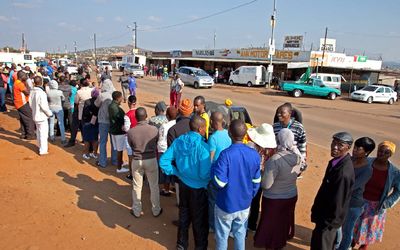ELECTORAL Commission of South Africa vice-chairman Terry Tselane vowed on Wednesday morning that residents of areas that had experienced violent protests in the days running up to the polls would be given the opportunity to vote.
Areas including Bekkersdal on the West Rand and Gugulethu on the East Rand have seen tension and protests with an "anti-election" flavour as protesters attempted to declare their com munities "no go areas" for IEC staff and officials.
Residents in a Gugulethu informal settlement told Business Day on Tuesday that they wanted to vote but were not sure if they would be given the opportunity to do so after protesters burnt down a tent set up in the area as a voting station.
Mr Tselane said residents who lived in areas prone to protest violence could still vote.
"We will make sure everyone who can vote and would like to vote will be given the opportunity to do so. There is increased security and temporary stations will be set up in those areas. We will not allow violence to stop people from exercising their rights," Mr Tselane said.
The number of election incidents was significantly lower than in previous years, despite instances of delayed opening of polling stations due to logistical problems and community protests problems were not expected to persist through the course of the day, the commission said.
Chief electoral officer Mosotho Moepya, speaking at the commission’s command centre in Pretoria on Wednesday, said 95% of voting stations were running, despite delays including late arrival of staff. The number of instances was small compared to previous elections.
Despite unrest at Bekkersdal on the West Rand, where police nyalas and military vehicles lined the street on Wednesday morning after protestors burned down an IEC tent on Tuesday, and at Gugulethu on the East Rand, where a community policing forum and Transnet was also burned down on Tuesday, most polling was quiet.
Military vehicles were also deployed in Bushbuckridge, Mpumalanga, in a bid to ensure peace in an area that has been marked by African National Congress (ANC) faction-fighting in recent weeks.
The battle centres on Bohlabela ANC regional chairman Mandla Ndlovu, who is accused of having too much of a vested interest in local businesses, thereby preventing further development.
Last week, residents of Thulamahashe threatened not to vote at all.
There has been a heavy police presence in the area, with traffic officers and police officers working overtime to patrol streets against protests at night. Voting in the area on Wednesday, however, started peacefully.
Meanwhile in Nkandla, KwaZulu-Natal President Jacob Zuma cast his ballot in his home village.
Mr Zuma, who appears on the national ballot as the ANC’s presidential candidate, welcomed an Electoral Court ruling that a Democratic Alliance SMS campaign saying he had stolen money to add security arrangements to his Nkandla estate was based on false information. He said it was "as clear as anything" that the SMS was incorrect in stating that he stole taxpayers’ money to upgrade his private home in that same community.
Meanwhile, Deputy President Kgalema Motlanthe, Democratic Alliance (DA) leader Helen Zille, Agang SA leader Mamphela Ramphele and Economic Freedom Fighters leader Julius Malema were among the first politicians to vote on Wednesday morning.
The IEC said 25.3-million South Africans had registered to vote in the country’s fifth democratic national election, taking place just days after the 20th anniversary of the first democratic election on April 27 1994. About 31-million South Africans are eligible to vote, given their age.
Mr Motlanthe said he had high hopes for South Africa’s future under the next government administration.
"I’m optimistic that we will get to a point where our country will be governed efficiently with accountability and transparency. That is what the constitution enjoins us to do," Mr Motlanthe said.
Ms Zille, voting in Rondebosch, Cape Town, said the 2014 elections were extremely important, but the DA was also looking ahead to the next election and the one thereafter.
"The election is a platform to be able to change government peacefully," Ms Zille said.
Asked how she thought her party might do in the polls, she said: "We will see at the end of the day. I don’t like to speculate. Our goal in this election is to do better than in the last one."
Ms Ramphele, who graciously accepted a bouquet of proteas wrapped in green cellophane from a fellow voter, said she was "very proud of being part of the process to raise the bar on political discourse in South Africa".
Voting in Seapoint, Cape Town, Ms Ramphele reminisced about voting in Boston in the US 20 years ago, when she was there on sabbatical.
"When you have a first experience — it doesn’t matter what it is and we won’t go too far into that — you always are emotional," she said.
"I wept the whole way through and wept in the evening when we saw the results."
She said she was now filled with joy because the country had been given enough time to learn to be a mature democracy.
"I am very proud of being part of the process to raise the bar on political discourse in South Africa," she said.
Mr Malema arrived at the Mponegele Primary School in Seshego, Limpopo, with his grandmother, Sara Malema, two hours after the station opened.
Earlier, EFF and ANC supporters had a verbal altercation after ANC members set up a tent and distributed T-shirts bearing the face of President Jacob Zuma.
EFF members accused the ANC of lobbying for votes at the voting station. Police and IEC officials intervened and the matter was resolved.
Some analysts in Limpopo believe the EFF could take seats currently occupied by other opposition parties in the provincial legislature.
Mr Malema was head of the ANC Youth League until he was expelled from the ANC.
According to reports, some voting stations reportedly suffered logistical setbacks, delaying voting for a number of South Africans including Minister of Home Affairs Naledi Pandor.
But generally spirits were high among urban voters. In Mamelodi, east of Pretoria, Mamelodi Sundowns were well represented among voters, as shirts, flags and various pieces of memorabilia accompanied supporters to the polling stations in the township.
Sundowns ended a six-year wait for silverware as they were crowned league champions at Loftus Versfeld on Tuesday evening, edging fierce rivals SuperSport United 3-0 to ease to the title with a game to spare.
A host of voters waited patiently in line, including a family of four Downs’ supporters, each sporting a replica shirt and headgear.
"It’s been a long wait for Sundowns but we are the winners," Jeff Letlabika said at Ndima Primary School.
"We are happy today because we can vote and Sundowns won last night, we don’t mind waiting now in this line. We will celebrate."
With Sapa

Residents of Atteridgeville standing in long queues and others casting their votes at Mahlogonolo Ledwaba in May last year. Picture: GCIS
ELECTORAL Commission of South Africa vice-chairman Terry Tselane vowed on Wednesday morning that residents of areas that had experienced violent protests in the days running up to the polls would be given the opportunity to vote.
Areas including Bekkersdal on the West Rand and Gugulethu on the East Rand have seen tension and protests with an "anti-election" flavour as protesters attempted to declare their com munities "no go areas" for IEC staff and officials.
Residents in a Gugulethu informal settlement told Business Day on Tuesday that they wanted to vote but were not sure if they would be given the opportunity to do so after protesters burnt down a tent set up in the area as a voting station.
Mr Tselane said residents who lived in areas prone to protest violence could still vote.
"We will make sure everyone who can vote and would like to vote will be given the opportunity to do so. There is increased security and temporary stations will be set up in those areas. We will not allow violence to stop people from exercising their rights," Mr Tselane said.
The number of election incidents was significantly lower than in previous years, despite instances of delayed opening of polling stations due to logistical problems and community protests problems were not expected to persist through the course of the day, the commission said.
Chief electoral officer Mosotho Moepya, speaking at the commission’s command centre in Pretoria on Wednesday, said 95% of voting stations were running, despite delays including late arrival of staff. The number of instances was small compared to previous elections.
Despite unrest at Bekkersdal on the West Rand, where police nyalas and military vehicles lined the street on Wednesday morning after protestors burned down an IEC tent on Tuesday, and at Gugulethu on the East Rand, where a community policing forum and Transnet was also burned down on Tuesday, most polling was quiet.
Military vehicles were also deployed in Bushbuckridge, Mpumalanga, in a bid to ensure peace in an area that has been marked by African National Congress (ANC) faction-fighting in recent weeks.
The battle centres on Bohlabela ANC regional chairman Mandla Ndlovu, who is accused of having too much of a vested interest in local businesses, thereby preventing further development.
Last week, residents of Thulamahashe threatened not to vote at all.
There has been a heavy police presence in the area, with traffic officers and police officers working overtime to patrol streets against protests at night. Voting in the area on Wednesday, however, started peacefully.
Meanwhile in Nkandla, KwaZulu-Natal President Jacob Zuma cast his ballot in his home village.
Mr Zuma, who appears on the national ballot as the ANC’s presidential candidate, welcomed an Electoral Court ruling that a Democratic Alliance SMS campaign saying he had stolen money to add security arrangements to his Nkandla estate was based on false information. He said it was "as clear as anything" that the SMS was incorrect in stating that he stole taxpayers’ money to upgrade his private home in that same community.
Meanwhile, Deputy President Kgalema Motlanthe, Democratic Alliance (DA) leader Helen Zille, Agang SA leader Mamphela Ramphele and Economic Freedom Fighters leader Julius Malema were among the first politicians to vote on Wednesday morning.
The IEC said 25.3-million South Africans had registered to vote in the country’s fifth democratic national election, taking place just days after the 20th anniversary of the first democratic election on April 27 1994. About 31-million South Africans are eligible to vote, given their age.
Mr Motlanthe said he had high hopes for South Africa’s future under the next government administration.
"I’m optimistic that we will get to a point where our country will be governed efficiently with accountability and transparency. That is what the constitution enjoins us to do," Mr Motlanthe said.
Ms Zille, voting in Rondebosch, Cape Town, said the 2014 elections were extremely important, but the DA was also looking ahead to the next election and the one thereafter.
"The election is a platform to be able to change government peacefully," Ms Zille said.
Asked how she thought her party might do in the polls, she said: "We will see at the end of the day. I don’t like to speculate. Our goal in this election is to do better than in the last one."
Ms Ramphele, who graciously accepted a bouquet of proteas wrapped in green cellophane from a fellow voter, said she was "very proud of being part of the process to raise the bar on political discourse in South Africa".
Voting in Seapoint, Cape Town, Ms Ramphele reminisced about voting in Boston in the US 20 years ago, when she was there on sabbatical.
"When you have a first experience — it doesn’t matter what it is and we won’t go too far into that — you always are emotional," she said.
"I wept the whole way through and wept in the evening when we saw the results."
She said she was now filled with joy because the country had been given enough time to learn to be a mature democracy.
"I am very proud of being part of the process to raise the bar on political discourse in South Africa," she said.
Mr Malema arrived at the Mponegele Primary School in Seshego, Limpopo, with his grandmother, Sara Malema, two hours after the station opened.
Earlier, EFF and ANC supporters had a verbal altercation after ANC members set up a tent and distributed T-shirts bearing the face of President Jacob Zuma.
EFF members accused the ANC of lobbying for votes at the voting station. Police and IEC officials intervened and the matter was resolved.
Some analysts in Limpopo believe the EFF could take seats currently occupied by other opposition parties in the provincial legislature.
Mr Malema was head of the ANC Youth League until he was expelled from the ANC.
According to reports, some voting stations reportedly suffered logistical setbacks, delaying voting for a number of South Africans including Minister of Home Affairs Naledi Pandor.
But generally spirits were high among urban voters. In Mamelodi, east of Pretoria, Mamelodi Sundowns were well represented among voters, as shirts, flags and various pieces of memorabilia accompanied supporters to the polling stations in the township.
Sundowns ended a six-year wait for silverware as they were crowned league champions at Loftus Versfeld on Tuesday evening, edging fierce rivals SuperSport United 3-0 to ease to the title with a game to spare.
A host of voters waited patiently in line, including a family of four Downs’ supporters, each sporting a replica shirt and headgear.
"It’s been a long wait for Sundowns but we are the winners," Jeff Letlabika said at Ndima Primary School.
"We are happy today because we can vote and Sundowns won last night, we don’t mind waiting now in this line. We will celebrate."
With Sapa













 News, views and analysis of South Africa's national and provincial elections on May 7 2014
News, views and analysis of South Africa's national and provincial elections on May 7 2014







Change: -0.47%
Change: -0.57%
Change: -1.76%
Change: -0.34%
Change: 0.02%
Data supplied by Profile Data
Change: -1.22%
Change: -0.40%
Change: -0.47%
Change: 0.00%
Change: -0.39%
Data supplied by Profile Data
Change: 1.21%
Change: 1.36%
Change: 1.01%
Change: 0.73%
Change: 1.17%
Data supplied by Profile Data
Change: 0.04%
Change: -0.52%
Change: 0.26%
Change: -1.21%
Change: -1.48%
Data supplied by Profile Data